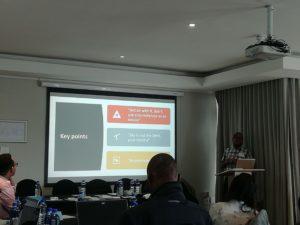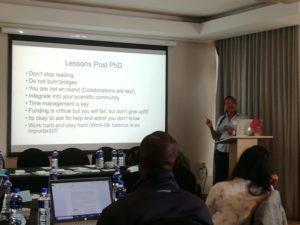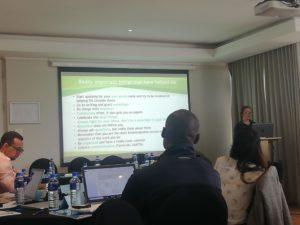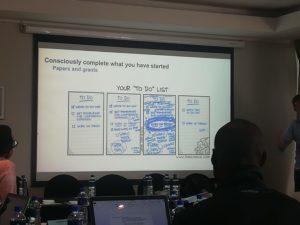The 9th IDA Symposium began with a “Science and Career Advice” session presented by Yaw Bediako, Kondwani Jambo, One Dintwe, Simone Richardson and Thomas Scriba. All speakers were once IDA as a student or Post-Doc, and are now faculty members. Highlights of their talks were:
Yaw Bediako (YB): “Be active in your science career, go out and make the changes happen.” “Sometimes it won’t work out, other times it does. I didn’t get one of the first fellowships I applied for, even though I “ticked” all the boxes. Looking back I am grateful I didn’t because I am a better scientist for it.” Sometimes rejection from a scholarship, fellowship or grant makes you re-evaluate your goals and the path you planned in taking to achieve them.
 Kondwani Jambo (KJ): “When I apply for a grant, I go for the biggest. So that if and when I get it, I can inspire the next person with the same [educational] background that they too can do it .” “Academic culture should care about the person, and not the products [research output]. If you invest in the person then you will get the product.” “We need to foster more intra-Africa collaboration. When you meet someone at any conference and/or workshop, do try and talk to them. This is how collaborations start. You don’t need a princioal invesitigator (PI) to initiate a collaboration.”
Kondwani Jambo (KJ): “When I apply for a grant, I go for the biggest. So that if and when I get it, I can inspire the next person with the same [educational] background that they too can do it .” “Academic culture should care about the person, and not the products [research output]. If you invest in the person then you will get the product.” “We need to foster more intra-Africa collaboration. When you meet someone at any conference and/or workshop, do try and talk to them. This is how collaborations start. You don’t need a princioal invesitigator (PI) to initiate a collaboration.”
 One Dintwe (OB): “Read outside of your research area”. ” Always ask questions”. “And know your niche” everyone must have one. “In industry they have “strict” endpoints, if in a year it doesn’t work, they cut it and do not put more effort into it. In academia, we shall struggle for 2 years sometimes to no success. Maybe we can apply the industry tactic. If it doesn’t work, and we have conducted all the troubleshooting we can then we should cut it. and put our effort into another project.”
One Dintwe (OB): “Read outside of your research area”. ” Always ask questions”. “And know your niche” everyone must have one. “In industry they have “strict” endpoints, if in a year it doesn’t work, they cut it and do not put more effort into it. In academia, we shall struggle for 2 years sometimes to no success. Maybe we can apply the industry tactic. If it doesn’t work, and we have conducted all the troubleshooting we can then we should cut it. and put our effort into another project.”
 Simone Richardson (SR): “Remember your self-worth. You are the base of your pyramid, all the grants, papers and successful projects are layers to your pyramid. If something doesn’t work out. Remember you are the base of your pyramid.”
Simone Richardson (SR): “Remember your self-worth. You are the base of your pyramid, all the grants, papers and successful projects are layers to your pyramid. If something doesn’t work out. Remember you are the base of your pyramid.”
 Thomas Scriba (TS):“Consciously make an effort to finish what you started.” “Choose something you are passionate about…So that you can say: You know what, [to]day will be a hard day but it’s worth it”
Thomas Scriba (TS):“Consciously make an effort to finish what you started.” “Choose something you are passionate about…So that you can say: You know what, [to]day will be a hard day but it’s worth it”
Their talks were followed up by panel discussion, which allowed students to ask for advice about the scientific research process and careers. Some of the QnA’s were:
How do I know the review is good? TS: Ask someone who has more experience [than you], this can be anyone from senior students in your research groups, to leading PI’s in the field *though they may not reply*. A simple email stating that “I am new to the field and I would like to learn more about the field. Which reviews would you recommend ?” could go a long way. Sometimes you can search for reviews in the top journals, this doesn’t mean that they are all great. But generally, top journals do not publish bad reviews. Read as many as reviews as you can, and you will recognise themes. Please do read some of the original literature as well, there is a lot you can learn from them.
Should we always be looking out [of Africa] to pursue a Post-Doc?
- YB & KJ: Nowadays it is less important than it used to be because there are Post-Doc opportunities in the many research institutes across the continent. The new generation is fortunate to have the opportunity to stay and rather than leaving “Africa” out of necessity.
- SR: Ultimately, going to Post-Doc abroad depends on your own situation, some want to have the experience of living in a different country (like I do), others may have to leave because the technical expertise they want are in the global north. Its always better to learn from the experts before you apply the technique.
- YB: Keep in mind that it can be difficult to come back [to Africa] and the adjustment can be challenging. So remember “to be intentional, and plan your long term move back from the moment you settle and start your Post-Doc.”
- TS: It is important to expose yourself, and open your thinking. This may not necessarily require you to, spend more than a year in a new country. Attending conferences, workshops and short-term (3-6 months) fellowships, are all ways you can expose yourself without committing to stay in the global North. Sometimes going out of Africa can lead to the realisation that we are good enough to do research at home. And we belong to the international scientific community.
How do you define success as a scientist? This was a difficult question to answer.
- OD: What you see as success will depend on where you are. It used to be about how much first or last author papers you have to your name. We need to redefine the criterion for success. In some institutions, it now based on a combination of teaching, supervision of students, managing projects as well as other criteria.
- SR: Defining success is personal, and you have to define it for yourself.











